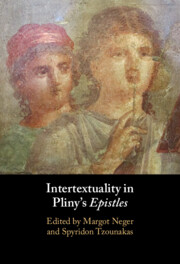Book contents
- Intertextuality in Pliny’s Epistles
- Intertextuality in Pliny’s Epistles
- Copyright page
- Contents
- Contributors
- Acknowledgements
- Abbreviations
- Introduction
- Part I Intertextuality and Interdiscursivity in Pliny’s Letters
- Part II Models and Anti-Models: Pliny’s Interaction with Oratory and Natural History
- Part III Pliny and Seneca: Discourses of Grief and Posthumous Reputation
- Part IV Pliny’s Villas and Their Poetic Models
- Chapter 9 The Villa and the Monument: Horace in Pliny, Epistles 1.3
- Chapter 10 The Villas of Pliny and Statius
- Part V Pliny Turns Nasty: Satire and the Scoptic Tradition
- Part VI Final Thoughts: Discourses of Representation and Reproduction
- Bibliography
- General Subject Index
- Index Locorum
Chapter 9 - The Villa and the Monument: Horace in Pliny, Epistles 1.3
from Part IV - Pliny’s Villas and Their Poetic Models
Published online by Cambridge University Press: 07 September 2023
- Intertextuality in Pliny’s Epistles
- Intertextuality in Pliny’s Epistles
- Copyright page
- Contents
- Contributors
- Acknowledgements
- Abbreviations
- Introduction
- Part I Intertextuality and Interdiscursivity in Pliny’s Letters
- Part II Models and Anti-Models: Pliny’s Interaction with Oratory and Natural History
- Part III Pliny and Seneca: Discourses of Grief and Posthumous Reputation
- Part IV Pliny’s Villas and Their Poetic Models
- Chapter 9 The Villa and the Monument: Horace in Pliny, Epistles 1.3
- Chapter 10 The Villas of Pliny and Statius
- Part V Pliny Turns Nasty: Satire and the Scoptic Tradition
- Part VI Final Thoughts: Discourses of Representation and Reproduction
- Bibliography
- General Subject Index
- Index Locorum
Summary
In letter 1.3 Pliny urges his friend Caninius Rufus to take advantage of the tranquillity of his villa to cultivate literary activity, for which (especially when it comes to poetry) Caninius shows aptitude. This exhortation is reinforced by and embellished with intertextual allusions: in particular Pliny evokes Hor. carm. 3.30. By alluding to this and other texts by Horace, Pliny builds an argument where the subject of posthumous memory is combined with that of the right to property. Unlike material goods – among them the villa – literary works are not passed on to heirs but forever remain the (intellectual) property of their authors.
- Type
- Chapter
- Information
- Intertextuality in Pliny's Epistles , pp. 187 - 199Publisher: Cambridge University PressPrint publication year: 2023

